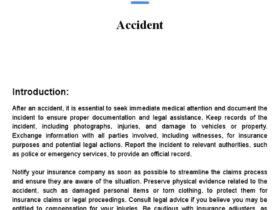Accidents happen. Despite our best efforts to create safe working environments, unforeseen events can lead to injuries, impacting not only an employee’s physical well-being but also their financial stability. Understanding accident insurance at work is crucial for both employers and employees to ensure adequate protection and support in the event of an accident. This guide provides a detailed overview of what accident insurance is, how it works, and why it’s an essential component of a comprehensive employee benefits package.
What is Accident Insurance?
Accident insurance is a type of insurance policy that provides financial benefits to individuals who suffer injuries due to an accident. Unlike workers’ compensation, which primarily covers workplace injuries, accident insurance offers 24-hour protection, covering accidents both on and off the job. This means you’re covered whether the injury happens at work, at home, or during leisure activities.
It’s important to differentiate accident insurance from health insurance. While health insurance covers medical expenses related to illness and injury, accident insurance provides a lump-sum payment or weekly benefits that can be used to cover a range of expenses, including medical bills, lost wages, and other related costs. This financial assistance can be invaluable during a time when finances may be strained due to the inability to work.
How Does Accident Insurance Work?

Accident insurance policies typically work by providing a range of benefits based on the type and severity of the injury sustained. Here’s a breakdown of common benefits:
- Lump-Sum Payment for Accidental Death or Dismemberment: In the event of accidental death, loss of limbs, or permanent disability resulting from an accident, the policy pays out a lump sum. This can provide crucial financial support to the employee’s family or to the employee themselves to help adjust to a new way of life.
- Weekly Benefits for Temporary Disability: If an accident results in temporary disability that prevents an employee from working, the policy provides weekly benefits to replace lost income. These benefits typically begin after a waiting period (e.g., seven days) and can continue for a specified duration, such as up to 104 weeks.
- Coverage for Medical Expenses: Some accident insurance policies also cover medical expenses incurred as a result of an accident, such as the cost of physiotherapy or other treatments prescribed by a qualified medical professional. This can help alleviate the financial burden of medical bills on top of lost income.
The specific benefits and coverage amounts vary depending on the policy. It is important to carefully review the policy details to understand what is covered and what the limitations are.
Why is Accident Insurance Important?

Accidents can happen anywhere, anytime. While workers’ compensation provides coverage for workplace injuries, it doesn’t extend to accidents that occur outside of work. Accident insurance fills this gap, offering round-the-clock protection.
Here are several reasons why accident insurance is an important consideration:
- Financial Protection: Accidents can lead to significant medical expenses, lost wages, and other unexpected costs. Accident insurance provides a financial safety net to help cover these expenses and maintain financial stability during a challenging time.
- 24/7 Coverage: Unlike workers’ compensation, accident insurance covers accidents both on and off the job, providing comprehensive protection regardless of where or when the accident occurs.
- Supplement to Health Insurance: Accident insurance can help cover out-of-pocket expenses associated with medical treatment, such as deductibles, co-pays, and other uncovered costs.
- Peace of Mind: Knowing that you have accident insurance in place can provide peace of mind, knowing that you and your family are protected financially in the event of an accident.
According to statistics, a significant number of non-fatal employee injuries are reported each year. Accident insurance can help mitigate the financial impact of these injuries, providing much-needed support to employees and their families.
How to Obtain Accident Insurance at Work

There are typically two main ways to obtain accident insurance at work:
- Employer-Sponsored Plans: Some employers offer accident insurance as part of their employee benefits package. These plans may be fully or partially funded by the employer, or employees may have the option to purchase coverage through payroll deductions. This makes it easier for employees to obtain coverage as premiums are automatically taken from their salary.
- Individual Policies: Employees can also purchase individual accident insurance policies directly from insurance companies. This option provides greater flexibility in terms of coverage levels and policy features, but it also requires employees to research and compare policies on their own.
If your employer offers accident insurance, carefully review the policy details and consider whether the coverage meets your needs. If not, you may want to explore individual policy options to supplement your coverage.
Reporting an Accident and Making a Claim
If you’re involved in an accident at work, it’s important to take the following steps:
- Report the Accident: Report the accident to your employer as soon as possible. Make sure the accident is recorded in the company’s accident book, if one exists.
- Seek Medical Attention: Seek medical attention for your injuries, even if they seem minor. This will ensure that you receive proper treatment and that your injuries are documented for insurance purposes.
- Gather Documentation: Gather all relevant documentation, including medical records, accident reports, and witness statements. This information will be needed when you file a claim with your insurance company.
- File a Claim: Contact your insurance company to file a claim for benefits. Follow their instructions carefully and provide all required documentation.
Exclusions and Limitations
Like all insurance policies, accident insurance policies have certain exclusions and limitations. Common exclusions may include injuries resulting from intentional acts, pre-existing conditions, or certain hazardous activities. Be sure to review the policy details carefully to understand any exclusions that may apply. For example, coverage might not be offered to individuals working at heights above a certain threshold or those involved in specific trades with inherent risks. Certain hazardous activities, such as winter sports or mountaineering, may also be excluded from coverage.
Conclusion
Accident insurance at work is a valuable benefit that can provide financial protection and peace of mind in the event of an accident. By understanding what accident insurance is, how it works, and why it’s important, both employers and employees can make informed decisions about their coverage needs and ensure adequate protection in the face of unexpected events. Whether obtained through an employer-sponsored plan or an individual policy, accident insurance can serve as a crucial safety net, helping to mitigate the financial impact of accidents and support individuals during times of need.





Leave a Reply